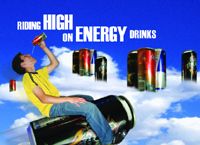Riding high on energy drinks
The recent explosion of energy drinks into the consumer market begs the question: how do these highly marketed and easily accessible beverages affect the health of young consumers?

Key Points
Monster. Rockstar. Full Throttle. NoFear. Red Bull. No, these aren't names of professional wrestlers or the latest video games. They're a new breed of beverages, so-called energy drinks, and their sales have grown more than 700% since 2000.1 There are literally hundreds of different energy drinks now available in the US and the world over, with new brands being released all the time. Red Bull, for example, accounts for two thirds of the energy drink consumption in the US.2

More and more of these drinks are being aggressively marketed to young people as an aid for school, socializing, or sports. Students use them to stay up for an all-night cramming session before an exam. Young people in high school and college drink them to stay out late partying. Athletes use them to improve performance.
Though the definition of energy drinks can vary, for this discussion we will define them as beverages that contain caffeine and other substances marketed to enhance performance. However, there is limited data to prove these claims. A very small study demonstrated that energy drinks improve concentration, reaction time, memory, mood, as well as aerobic and anaerobic endurance.3
In this article, we'll examine the five ingredients most commonly found in energy drinks: caffeine, guarana, ginseng, taurine, and carnitine. We will review the mechanism of action of each ingredient, when known, and its therapeutic uses, adverse effects, and drug interactions, with attention to any known health effects on children and adolescents.
Caffeine

Individual responses to caffeine vary widely and also depend on the amount that is routinely consumed.6 Therefore, it is difficult to link precise caffeine intake levels to specific health effects. For example, in a healthy adult, a small amount of caffeine may have positive effects, such as increased alertness or ability to concentrate. However, some people are more sensitive. For them, a small amount of caffeine could cause insomnia, headaches, anxiety, rapid heartbeat, increased blood pressure, irritability, indigestion, and nervousness.7 This is a particular concern for children whose intake of caffeine varies more than in adults.